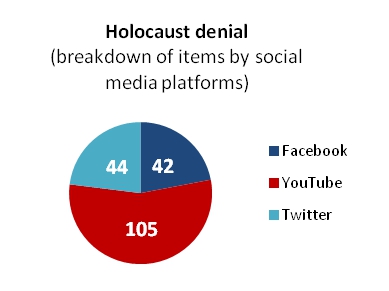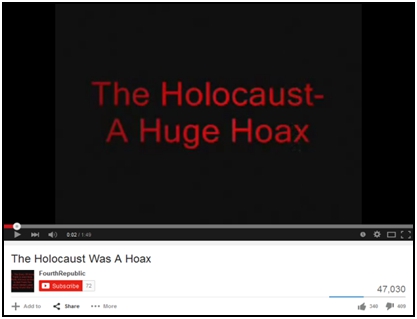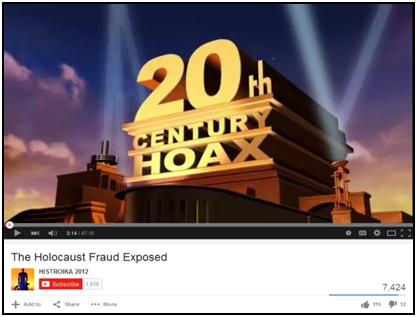OHPI has consistently fought for Holocaust denial to be recognised by social media platforms as a form of hate speech, and hence banned. We examined the topic in previous briefings such as Holocaust Denial & Social Media and Reporting Holocaust Proud Deniers. Holocaust denial used to be the preserve of fringe groups in society, but social media has allowed this content to spread widely.
Not only does Holocaust denial hurt the sentiments of the Holocaust survivors and their children by belittling their pain and loss, it is used to promote a revival of the far right, and as a ruse to delegitimize of the State of Israel (read our briefing on Modern Antisemitism).
Holocaust denial includes content that, as explained in the working definition of antisemitism, “denies the fact, scope, mechanisms (eg gas chambers) or the intentionality of the genocide of the Jewish people at the hands of the Nazi government during the World War II”. It also covers content that accuses Jews or the state of Israel of inventing or exaggerating the Holocaust.
In a new report “Online Antisemitism: Meeting the Challenge” that OHPI will be releasing at the Global Forum for Combating Antisemitism we examine, among other topics, how Holocaust denial operates across three social media social media platforms: Facebook, Twitter and YouTube.
The report is based on antisemitic online content crowd-sourced by OHPI using its online hate reporting tool FightAgainstHate.com. The tool allows people to report antisemitic content from Facebook, Twitter and YouTube and categorise them as: Promoting violence against Jews, Holocaust denial, traditional antisemitism and new antisemitism (Israel-related antisemitism).
Nearly 12% of the 2024 items reported into the system fell into the category of Holocaust denial. Each item represented a unique YouTube video, Facebook page, Twitter user, etc. YouTube had a largest share of items reported as Holocaust denial. Nearly 55% of all Holocaust denial items reported were videos uploaded to YouTube. Many of these include supposed documentaries making dubious claims, clips of speeches and talks by famous Holocaust deniers and discredited academics (such as Louis FarraKhan), and people uploading videos of themselves denying the Holocaust.
The content we collected shows that Holocaust denial on social media takes place in two forms. First is outright denial of the fact that the Holocaust ever occurred or claiming that the number of Jews killed is grossly exaggerated. The second form mocks the victims of the Holocaust.
Collecting such data and examining how social media is being used to spread lies about the Holocaust is an important step towards combating such antisemitic speech. It gives us a knowledge base to build counter speech against Holocaust denial. And it also gives the necessary evidence to put targeted pressure on social media companies to remove such content.
OHPI’s report is by no means an all encompassing study of antisemitism online. However, it is an example of the kind of data that can be available in the future through the FightAgainstHate.com system.
OHPI urges NGOs, academics and government agencies fighting online antisemitism to use FightAgainstHate.com to collect and document items of online hate. The tool will help them categorise the data, monitor the time taken by social media platforms to remove such content, and to build reports like the one we are releasing at the Global Forum. It can help boost capacity for campaigns and policy initiatives to combat online antisemitism.
Below are some examples of YouTube videos which contain Holocaust Denial:
Example 1: This YouTube video is a series of text panels reciting Holocaust ‘facts’ denying the existence of gas chambers, challenging the authenticity of The Diary of Anne Frank, and claiming that Rudolph Hess was tortured and forced to give a fake confession
Example 2: This is an almost 50 minute long ‘documentary’ claiming to debunk the extermination aspect of concentration camps such as Treblinka, culminating in statements that Germans were torture into giving false confessions of overseeing the murder of Jews



